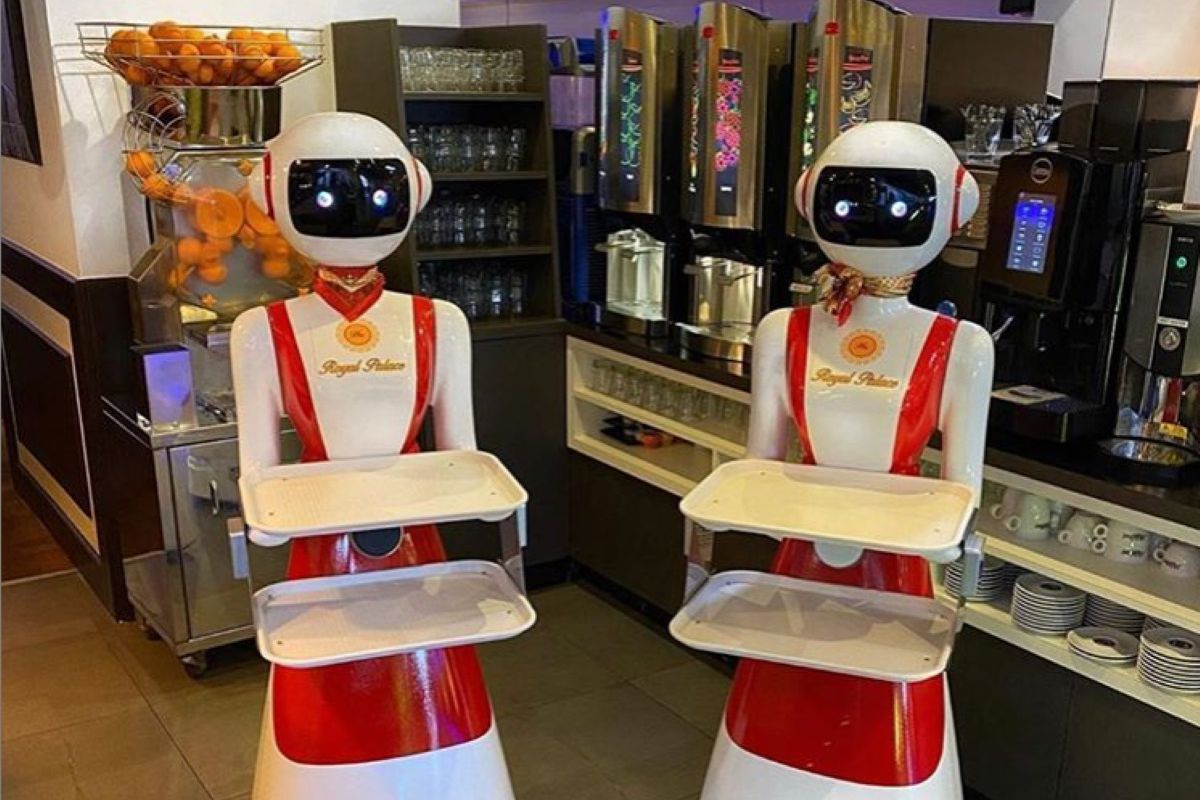The robot wait table is not new. But one of the reasons I'm not losing weight is that it's clumsy and a little intimidating. But it's changing rapidly, and the best evidence could be in remote mountainous areas of Nepal.
Paaila Technology, a 17-month tech startup in Nepal, has introduced a new technology, a waiter robot called Ginger. An innovation in robotics and artificial intelligence, Ginger aims to modernize restaurant spaces and provide customers with the best restaurant experience. Paaila Technology started development of Ginger in August 2017. The waiter robot will be officially announced at Naulo Restaurant and will open in Durbar Marg in about two weeks.
At the Naulo restaurant in downtown Kathmandu, Ginger and two robot colleagues "chat" with customers and even make jokes in English when asked. Their hand-painted rounded shape and almost compassionate eyes with large blinks help relieve my discomfort when ordering chicken fingers and french fries. The Ginger is the brainchild of Rabin Giri (26) and his colleagues at Paaila Technology, an award-winning robotics and artificial intelligence startup founded in 2016 by a group of college friends and engineers. Robots are more advanced than other iterations in the area. The robot communicates directly with the kitchen staff to provide swarm intelligence and voice recognition to guests. When idle, dock to a nearby wall to allow guests to eat undisturbed.
The debate about robots in the workplace is very controversial. Depending on where you are, the speed at which AI advances can be exciting, worthwhile, or even horrifying. Anyone who sees a conversation with Sophia, a social humanoid made in Hong Kong that has left some of the best interviewers in the world silent, is intrigued and worried about the potential narrowing gap between humans and machines. Will do. Giri sees robots as a force of good. “AI systems and robots reduce the work that requires repetitive mechanical tasks,” he says. "We need to understand that robotics intelligently shifts the workforce from machines and not unemployment." As Chief Operating Officer and Senior Robot Engineer at Paaila Technology, Giri said his startup was in this change. I want to be at the forefront. A rough plan for his global hegemony in robotics is as follows: We will maintain most of the research and development in Nepal, outsource mass production to China, and then sell the robots all over the world. We are very proud that the company's 19 employees are all Nepalese.
Giri is shy about the specific details of the master plan, but the startup's track record suggests that its ambitions aren't ridiculous. In addition to Ginger, the company builds and operates Pari, a robot receptionist used by several Kathmandu banks. It will be upgraded in the coming months for use in hospitals, cinemas and shopping malls. This year, Ginger 2.0 will be released with software that makes it easy to take food orders verbally. Paaila also manufactures chatbot software and sells it to Nepalese companies. Awarded in September by a leading Nepalese mentoring company, the best glory of Nepal's most creative startups and restaurants offering free food and free advertising suggest it's heading in the right direction. I am. The company has sold five robots so far, and Giri refuses to reveal its costs. The main competitor is Suzhou Pangolin Robot Corp, a Chinese service robot company that sells Alice models for about $ 3,000. Is. Results are mixed, but the service and waiter robot sector is evolving rapidly. Two restaurants using locally made robots in Guangzhou, China, faced robots that initially diminished general curiosity and prevented owners from performing basic tasks such as customer orders. It closed in 2016. Conversely, California-based Bear Robotics received a $ 2 million investment last year from South Korean food delivery app giant Woowa Brothers to help develop food delivery robots. However, the Bear Robotics model Penny does not have humanoid properties. The cafe in Budapest has a dance robot made in Japan, but a team of IT experts needs to be on site to monitor the work.
Shy and concise Gili clenched her teeth as a student at the Robotics Club of the prestigious Institute of Engineering at Tribhuvan University. There he is a member of Nepal's leading team and won numerous robot competitions in Indonesia in 2015 and in Bangkok a year later. Gili, whose parents run an electronics store in Lancot, west of Kathmandu, has long been interested in robots. When he was 11, he made his first miniature bulldozer. His colleagues say Giri's strength lies in his technical strength and determination to bring the company to the world. He works 12-14 hours a day and plays classical Hindi music in the background. He is single, has no children, and eats and sleeps in the office. His rare break from urban life is dedicated to hiking in the hills of the Himalayas. Overall, his introverted personality makes him very suitable for programming, testing, and repairing robots. "If two or more robots work together like our restaurant, even a small error in the system can be confusing," he wants to expand the concept of the restaurant internationally. Says Aayush Kasajoo, Paaila Technology Director and Naulo Owner. "Rabin has created a system in which robots communicate with each other and act accordingly. Three robots decide for themselves who will accept the order."
Source: Paaila Technology
The challenges facing Gili and his colleagues are not important. “In order to develop a system that can start a conversation with humans, we need to build a model and it takes days to train with a large amount of data,” says Giri. The startup lacks computers with high RAM and CPU capacity, so it costs about $ 600 a month to spend about $ 600 a month on Digital Ocean, an American cloud infrastructure provider. This is a huge amount in countries where GDP per capita is just over $ 1,000. After that, Nepal lacked physical infrastructure, and a magnitude 7.8 earthquake killed nearly 9,000 people in April 2015. The team's workshop in Kathmandu is simple, with no heating and cooling, and its equipment is outdated. But none of this undermines Giri's ambitions, as his country is flooded with bots. "By bringing the humanoid Sophia to Nepal at the United Nations Innovation Conference last March, the robots that Saudi Arabia gave citizenship aroused the interest of Nepalese," said the head of computer science and computer science. Bark Richnaval said. A pioneer in engineering and AI at Kathmandu University. There is one thing for sure. It means that the robot will come to a restaurant near you. Don't be surprised if it has the "Made in Nepal" stamp on it.
















